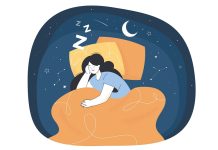
A new study has found that low-dose aspirin can help reduce inflammation caused by lack of sleep.
This research will be presented at the SLEEP 2024 annual meeting in Houston, Texas, from June 1–5.
The study showed that taking low-dose aspirin during times of sleep restriction reduced the body’s inflammatory response compared to a placebo.
Specifically, aspirin lowered levels of interleukin-6 and COX-1/COX-2, as well as C-reactive protein, which are markers of inflammation.
Lead author Larissa Engert, a postdoctoral fellow in neurology at Beth Israel Deaconess Medical Center and Harvard Medical School, explained, “The unique aspect of this study is that we explored whether we can reduce the inflammation caused by lack of sleep using medication.
We chose aspirin because it targets specific inflammation pathways that are affected by sleep loss.”
The researchers conducted a randomized, placebo-controlled trial with 46 healthy adults.
The study had three protocols: sleep restriction with aspirin, sleep restriction with placebo, and normal sleep with placebo. Each participant followed a 14-day at-home phase and an 11-day in-hospital stay.
In the sleep restriction with aspirin group, participants took low-dose aspirin both at home and in the hospital. Their hospital stay began with two nights of normal eight-hour sleep.
Then, participants in the sleep restriction groups had five nights with only four hours of sleep, followed by three nights of recovery sleep. The normal sleep group had eight hours of sleep each night during their hospital stay.
The researchers measured sleep and inflammation levels at various points during the study. They found that those who took aspirin during sleep restriction had reduced inflammation and better sleep quality during the recovery phase. Specifically, aspirin users experienced less wakefulness after falling asleep and better overall sleep efficiency.
Engert noted, “These findings suggest that taking low-dose aspirin can help reduce the inflammation caused by sleep loss. This could lead to new treatments that target these pathways without the side effects of aspirin, such as bleeding and stroke.”
These potential new treatments could complement behavioral therapies to improve sleep and better manage inflammation in people who often experience sleep deficiencies.
The study was supported by grants from the National Institutes of Health, the German Research Foundation, and the Sleep Research Society Foundation. The research abstract was published online in the journal SLEEP and will be presented at the SLEEP 2024 meeting.
This study provides hope for new ways to manage the harmful effects of sleep loss on the body, helping people stay healthier even when they can’t get enough sleep.
If you care about wellness, please read studies about how ultra-processed foods and red meat influence your longevity, and why seafood may boost healthy aging.
For more information about wellness, please see recent studies that olive oil may help you live longer, and vitamin D could help lower the risk of autoimmune diseases.



